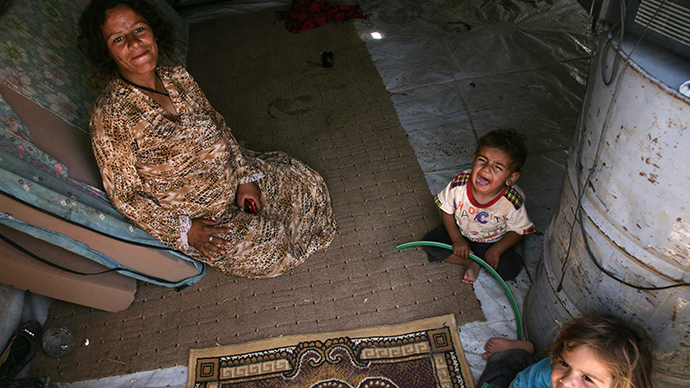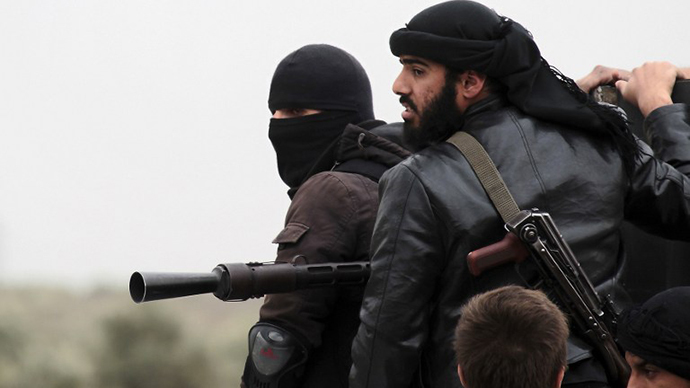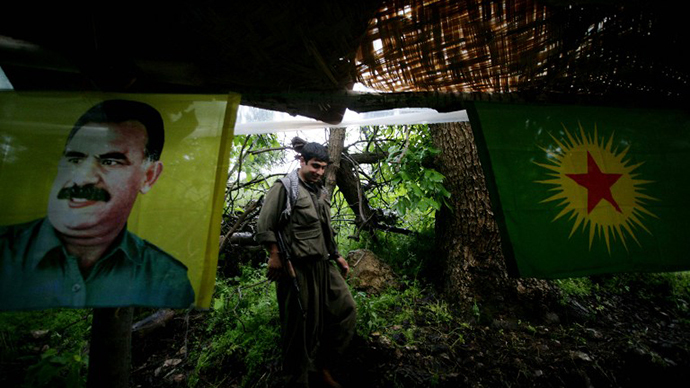US remains 'uninterested' as Kurds massacred by Syria’s militant opposition

Reports this week of the radical Islamist opposition in Syria massacring Kurds in the northern Syria is a disturbing development, but not nearly as disturbing as the strategic silence on the issue by the US and European government-media complex.
According to reports from the village of Tal Abyad near the Turkish border on Monday, jihadist terror brigades massacred some 450 residents, including 330 women and elderly, along with 120 youths and elderly near the Turkish border.
For nearly a year now, this Saudi and Qatari-financed armed opposition, known as Al-Nusra Front, or Jabhat Al-Nusra, has been enabled by its benefactors to run rampant in and around Syria. Because of the US and Britain’s cozy relationship with both their gulf allies Saudi Arabia and Qatar, very little, if any, condemnation has come from the political ring leaders of the Syrian reformation project based in Washington and London. The same goes for the Western media, who do not want to run any news that might further expose their political leaders’ own shaky history with Syria since the conflict began.
Any US congressional hearings or British parliamentary inquiries into the matter might just reveal too much information about the illegal flow of arms, or the presence of CIA, MI6, Mossad agents, along with any other undeclared special forces currently involved in operations around the conflict zone there. Given the current political climate, any such revelations would be a political disaster, especially for Washington.
Arab-Kurdish war in Syria?
Other disturbing reports of targeted violence in the region include Kurds being targeted by both Al-Nusra Front and the Free Syrian Army in northern Syria. Recently, in Tall Hassel and Tall Aren near Aleppo, 200 Kurds were said to have been taken hostage. There are also fears of the possibly that dozens of other civilians, including women and children, may have been brutally massacred there.
With the situation deteriorating, it’s clear that thousands of civilians are becoming trapped in this region, threatened with execution, rape and victims of kidnapping by the FSA and Al-Qaeda groups. It’s not yet known how many young people have been executed for the sole reason of being a Kurd.
By empowering these radical Islamic foreign-dominated fighters in Syria, the West and its Gulf State business affiliates have fueled a situation whereby fatwas could be issued in radical Sunni mosques in Syria and elsewhere - making Kurdish blood ‘legal’.
Al-Nusra Front’s efforts in the Kurdish region of Syria appear to
have an ethnic cleansing, or genocidal shape to them. These
radical Islamists appear to be motivated by religion and race, as
evidenced by the Islamic front’s public announcement of its wish
to carve out an independent religious and Arab state, or emirate,
in Northern Syria. Islamic rebels in Syria are already in the
process of re-branding themselves as the ‘Islamic State of
Iraq and al-Sham’, also known as Islamic State of Iraq and
the Levant (ISIS).

With so much Kurdish blood already spilt, it’s a foregone conclusion that most Syrian Kurds will never accept any alliance with the FSA-Islamist-Al-Qaeda confab. This means that fighting in the region could be a long and violent affair – especially if Washington and Ankara continue to employ a policy of willful ignorance towards the bloodshed there.
Washington’s blind eye towards the Al-Nusra Front terrorist conclave was forced out into the open last month when the US Congress voted against arming the Syrian rebels on the grounds that it’s now dominated by fighters with known terrorist affiliations, including Al-Qaeda. Many in the US government are beginning to realize that toppling the government of Bashar Assad at any cost is a cost too high to bear.
The facts on the ground over the last year reveal that the so-called ‘moderate opposition’ known as the Free Syrian Army is painfully weak, and dominated by dozens, if not hundreds of radical, foreign-led Islamist fighting groups, of which Al-Nusra Front is the largest and best-funded. Still, Washington will not openly condemn the terror group for fear that such a public decrial of foreign militant terror in Syria would discredit the West’s entire effort over the last two years of characterizing the Syrian Armed Opposition as some sort of progressive, modern democratic, freedom-loving homogenous effort.
Russian Foreign Minister Sergey Lavrov probably said it best, when he explained recently, “We saw before some Security Council members reluctant to condemn terror attacks in Syria on the grounds that – as cynical as it sounds – those attacks are being carried out by people fighting against an obsolete regime. This position is absolutely unacceptable. No double standards can be applied to terrorism.”
Truer words could not have been spoken. It seems that in their imperial scramble to reform the Middle East to suit its corporate and Israeli-driven interests, the West has all but surrendered its moral pulpit to Russia, and after the dust settles in Syria, it’s unlikely that neither the US or Britain will be able to ever to preach to the international community about the War on Terror.
Turkey, it seems, is now caught in the geopolitical crossfire – a victim of its leadership’s own dubious partnerships.
Prime Minister Erdogan has become hamstrung by his own overwhelmingly pro-Western, partisan positions taken early on in the Syrian destabilization effort which began in earnest two years ago. Last year’s visits with President Obama were centered on hopes of carving out a NATO buffer zone in northern Syria, but that never got off the ground. This past spring, US visits to regions were focused on getting Turkey to patch-up its differences with Israel. We now know what that was all about - as Turkey dived into the deep end this past June by allowing the Israeli Air Force to use Turkish bases to stage at least two bombing runs on Syria over the last two months.
This latest wave of violence against Syrian Kurds comes at a time when Turkish–Kurdish relations have been on the mend regionally. Ankara has made substantial progress towards peace and has even entered into bilateral energy partnership with the Kurdish Regional Government in Northern Iraq.
In addition to this, Turkey invited a prominent Syrian Kurdish
leader, Salih Muslim from the Partiya Yekîtiya Demokrat (PYD), in
order to open dialogue with the Foreign Ministry and intelligence
services in Ankara and Istanbul. This is significant because only
one year ago, Turkey was threatening military action because of
the PYD’s activities in northern Syria, which Ankara believed was
working in congress with its domestic nemesis, the Kurdistan
Workers Party (PKK) whose members reside inside Turkey. The
Turkish leadership is also engaged in a peace process with the
PKK in Turkey, and the results of this effort will ultimately
affect the outcome of its talks with the PYD in Syria.

Turkey is also well aware that the West’s proxy war in Syria is not going as well as geopolitical engineers in Washington, London and Paris think it is, and that Al-Nusra Front is being seen as an overwhelmingly negative phenomenon in terms of regional security – and therefore will move to distance itself from it. Any political alliance with the PYD would benefit Turkey in moving away from its uncomfortable proximity to the terrorist brigades of northern Syria.
According to a recent statement by PYD spokesman Alan Semo, “Groups such Al-Nusra, not the Kurds, were the real threat to Turkey’s security.”
“If you are going to work with us, we can protect you from these jihadists,” he said, addressing the Turkish government (Financial Times of London August 5, 2013).
Maybe Turkey has somewhat honest motives in this case, not least of all its own internal security, but time will tell how serious Ankara really is regarding its newfound support of Kurds in northern Syria. Certainly, Turkey is playing a very dangerous and potentially volatile game with its puppet master in Washington pulling strings and making threats from over the Western horizon.
None can ignore the strategic and geopolitical importance of the Kurdish national movement – a people without borders whose community straddles Syria, Turkey, Iraq and Iran. They are a people without a nation, both courted and reviled by power-players in governments, and yet, they may ultimately determine the outcome of not only the conflict in Syria, but the destiny of the entire region.
On a global scale, however, the conflict in Syria is still a proxy war, and the great powers will most likely try to ride out the conflict from an Imperial perspective. Rather than deploying their own troops, or attacking Syria themselves, they will continue to employ others in order to destabilize the region, in the hopes that when the piles of ashes lay thick, the West can glide in to marshal over the rebuilding process of economic and political reformation.
But that old plan may not actually work this time with Syria, it’s certainly not going well for central planning at the moment.
The statements, views and opinions expressed in this column are solely those of the author and do not necessarily represent those of RT.
The statements, views and opinions expressed in this column are solely those of the author and do not necessarily represent those of RT.













